|
|
|
Sort Order |
|
|
|
Items / Page
|
|
|
|
|
|
|
| Srl | Item |
| 1 |
ID:
118607
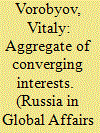

|
|
|
|
|
| Publication |
2012.
|
| Summary/Abstract |
As the center of gravity in global development shifts towards the Asia-Pacific region, the political significance of Central Asia as Eurasia's geopolitical core increases. China's rapidly evolving cooperation with this region becomes increasingly tight. But what interests lie behind this process? And how lasting can such cooperation be?
|
|
|
|
|
|
|
|
|
|
|
|
|
|
|
|
| 2 |
ID:
118599
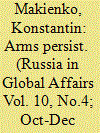

|
|
|
|
|
| Publication |
2012.
|
| Summary/Abstract |
Foreign Affairs recently published an article by Jonathan Caverley and Ethan B. Kapstein entitled "Arms Away. How Washington Squandered Its Monopoly on Weapons Sales." The article provides an extremely interesting view of the U.S. academics on developments in the arms market. Analyzing mainly changes in the U.S. position in this market, namely the loss by the United States in the 2000s of its monopoly on arms sales achieved in the 1990s, the authors also touch upon more fundamental issues. One of them is the general evolution of the configuration of players in this market. Another, largely theoretical issue is the basic factors, both political and economic, that influence this evolution. The main reason why the U.S. defense industry lost its position in the market, according to the authors, was that the U.S. defense industry focused on the production of cutting-edge and excessively expensive weapons, which have begun to lose to simpler and more affordable weapons systems made in Europe, Russia, Israel or even South Korea.
|
|
|
|
|
|
|
|
|
|
|
|
|
|
|
|
| 3 |
ID:
118602
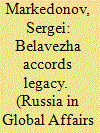

|
|
|
|
|
| Publication |
2012.
|
| Summary/Abstract |
The USSR ceased to exist in December 1991, but the dramatic events of the two subsequent decades have shown that it is premature to view its collapse as a closed chapter of history. The termination of the Soviet Union's existence as a legal fact and the historical process of its disintegration are different things. The country that accounted for one-sixth of the planet's land is gone from the world map, but the disintegration of Soviet statehood persists. Like the breakup of the Western Roman Empire does not boil down to the abdication of Romulus Augustus, or the French Revolution to the storming of the Bastille, or Russia's 1917 October Revolution to the October 25 (in the Julian calendar) coup, the breakup of the USSR is not confined to the December 1991 Belovezha declaration by heads of states of Russia, Ukraine and Belarus on its dissolution. That the process still continues is evidenced by eight armed conflicts, the de-facto emergence of new states (two of which have won international, albeit limited, recognition), unending border disputes, ethnic and religious clashes, and regional conflicts. In 2008 a precedent was created when the borders of former Soviet republics were redrawn. Given unsettled ethno-political conflicts, it is hard to predict when and how these borders will be recognized, and where the self-determination process, launched by Mikhail Gorbachev's perestroika policy, will stop.
|
|
|
|
|
|
|
|
|
|
|
|
|
|
|
|
| 4 |
ID:
118601
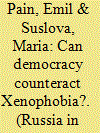

|
|
|
|
|
| Publication |
2012.
|
| Summary/Abstract |
Russians frequently engage in heated discussions about whether xenophobia is at the root of many large-scale conflicts. Some analysts - whom we shall call sporadic supporters of constructivism - hurl accusations at the mass media: there would be no phobias as a source of conflict if the media refrained from emphasizing the ethnic, racial, or religious identity of the conflicting sides or if they ignored such problems altogether. Supporters, also mostly sporadic, of the neo-institutional theory, which is more in fashion at present, object to such opinions and claim that conflicts arise out of flaws in the institutional system. If Russia were genuinely democratic and ruled by law, the fundamental prerequisites for ethnic and/or religious phobias would disappear.
|
|
|
|
|
|
|
|
|
|
|
|
|
|
|
|
| 5 |
ID:
118608
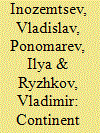

|
|
|
|
|
| Publication |
2012.
|
| Summary/Abstract |
Siberia is an immense territory that stretches for over 12.4 million square kilometers from the eastern slopes of the Urals to the Pacific Ocean. It took Russia more than four hundred years to develop this land in what proved to be the most ambitious colonization effort in history, during which one European people inhabited an area spanning from the eastern edge of Europe to the middle of North America's Pacific coast. Today Siberia's territory is large enough to easily accommodate any contemporary country. At the peak of the expansion (including Russian Alaska) this "European offshoot" (a term coined by Angus Maddison to denote territories occupied by European powers and subsequently inhabited mostly by descendants from Europe) was larger than the New World's Spanish colonies from Cape Horn to California and Texas, and could incorporate British territories in Asia three times over.
|
|
|
|
|
|
|
|
|
|
|
|
|
|
|
|
| 6 |
ID:
118598
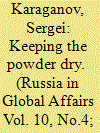

|
|
|
|
|
| Publication |
2012.
|
| Summary/Abstract |
Russia has embarked on a path of military enhancement. Programs for re-equipping and fundamentally reforming the armed forces are being adopted and implemented. Although foreign military threats are at an all-time low, this policy will be continued because it is consistent with emerging international realities and with the internal logic of Russia's development. For these reasons, the topic at hand is not to change the general course of the policy, but rather to optimize it while avoiding crude mistakes and the senseless waste of money.
|
|
|
|
|
|
|
|
|
|
|
|
|
|
|
|
| 7 |
ID:
118610
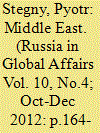

|
|
|
|
|
| Publication |
2012.
|
| Summary/Abstract |
The Arab Spring, which has been raging in the Middle East for two years, has swept away seemingly irremovable regimes in Egypt, Libya, Tunisia, and Yemen. In Syria, where the Ba'athist leadership has preserved its bond with the armed forces and law enforcement agencies, the civil war is escalating with unclear prospects for President Bashar al-Assad's regime. In terms of the democratic transformation of the region, during the past two years of the Arab Spring more has been done than in the entire history of the independent existence of Middle Eastern countries. However, the process is not yet complete: democratic change has affected the core of the Arab world and stopped in its periphery - at the borders of the traditionalist monarchies of the Persian Gulf, which are attempting to bribe their way out of long overdue transformations. Iraq, Lebanon, and Algeria are immune to "twitter revolutions," as they had earlier undergone (albeit with varying degree of success) the cycle of modernization, including foreign interventions and civil wars. The monarchies of Morocco and Jordan are adapting, with sufficient flexibility, to the imperatives of the day, and are continuing to make concessions to the opposition. Yet on the whole, the impression of the region is not that of a decisive pivot towards democracy, nor that of integration into global modernization processes.
|
|
|
|
|
|
|
|
|
|
|
|
|
|
|
|
| 8 |
ID:
118605
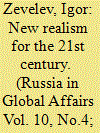

|
|
|
|
|
| Publication |
2012.
|
| Summary/Abstract |
Most experts agree that the Chinese economy will surpass the American economy in terms of absolute GDP within the next ten years. This change will occur within the tenure of the current political administration in Beijing, which came to power in November 2012. In the meantime, the United States will remain the strongest power militarily and retain its preeminence in the spheres of science, education, technological development and innovations. Over time, we will enter a fundamentally new epoch of world history, characterized by diversification of leadership in various fields amongst a large number of countries. Does Russia have a foreign policy strategy which can prepare it for these international changes? And how should Russia react to the growing competition between the U.S. and China today?
|
|
|
|
|
|
|
|
|
|
|
|
|
|
|
|
| 9 |
ID:
118596
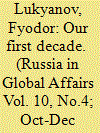

|
|
|
|
|
| Publication |
2012.
|
| Summary/Abstract |
Russia and the United States are trying hard to assure each other of their commitment to common goals and values. A nascent democracy is emerging in Afghanistan under the responsive guidance of the coun-terterrorist coalition. The Arab community is debating the causes of stagnation and lagging development. The European Union is poised to become a global leader as Europe's expanding and intensifying integration enters a decisive phase...
|
|
|
|
|
|
|
|
|
|
|
|
|
|
|
|
| 10 |
ID:
118611
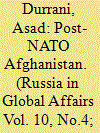

|
|
|
|
|
| Publication |
2012.
|
| Summary/Abstract |
Afghanistan is a land of extreme diversity. Fractured along various fault lines - geographic, ethnic, tribal, linguistic, and sectarian - it would not have emerged as a single unified state but for a "grand bargain" struck between its major communities. And that would not have happened without compelling reasons.
|
|
|
|
|
|
|
|
|
|
|
|
|
|
|
|
| 11 |
ID:
118609


|
|
|
|
|
| Publication |
2012.
|
| Summary/Abstract |
Russia has recently conducted an active policy to develop Siberia and the Russian Far East and to gain access to markets in the Asia-Pacific region. Drafting an agenda for Russia's presidency of the Asia-Pacific Economic Cooperation (APEC) in 2012 was a powerful stimulus to place an understanding of the strategic importance of this issue in the minds of the political leadership and public at large. Moscow openly proposed a thesis that it was the right moment to eliminate the imbalance between Europe and Asia in foreign-policy and in trade-and-investment cooperation priorities, as well as that a less-Eurocentric course corresponds to national interests.
|
|
|
|
|
|
|
|
|
|
|
|
|
|
|
|
| 12 |
ID:
118604


|
|
|
|
|
| Publication |
2012.
|
| Summary/Abstract |
The recent long-awaited change in government in Georgia has sparked a debate among political observers about how the October 2012 election will affect Russian-Georgian relations. The negative impact will be negligible because bilateral relations cannot get any worse than they already are. We can look towards the future with a small degree of cautious optimism. After all, a dream - whether in Georgia or somewhere else - is only a dream, not a plan of action. There are promises and expectations in both Russia and Georgia, and Georgians want change. However, the reality may be a far cry from promises and expectations.
|
|
|
|
|
|
|
|
|
|
|
|
|
|
|
|
| 13 |
ID:
118597


|
|
|
|
|
| Publication |
2012.
|
| Summary/Abstract |
We really live in a world of profound changes, and this is not a figure of speech but a concrete reality. As it often happens in history, these changes are developing not according to someone's scenario but sometimes even despite experts' estimates and forecasts. Suffice it to say that the globalization process has taken a turn quite different from that anticipated by its adepts twenty years ago. It was believed then that after the breakup of the Soviet Union and the socialist system the developed Western countries and large corporations would freely spread their influence around the world and that the liberal-democratic system would be the only beacon for all peoples "lagging behind." In reality, however, many developing countries have largely benefited from the globalization, as they have created modern industries and significantly improved the well-being of their populations, whereas developed countries have gone through the processes of de-industrialization, reduction of the middle class and growing social stratification.
|
|
|
|
|
|
|
|
|
|
|
|
|
|
|
|
| 14 |
ID:
118606
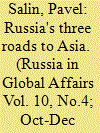

|
|
|
|
|
| Publication |
2012.
|
| Summary/Abstract |
Over the past couple of years researchers of different countries and schools have developed a unanimous view that the world's "center of power" is moving from the Transatlantic region towards the Pacific. Even inveterate skeptics now have to admit that the economic pole of power has shifted almost entirely to the Asia-Pacific, although they still harbor the illusion that the West in general and Europe in particular will remain cultural centers (including for Russia) and will retain at least part of their political capital. Yet world history shows that a shift of the economic center to another region inevitably entails a similar shift of the cultural and political components of power.
|
|
|
|
|
|
|
|
|
|
|
|
|
|
|
|
| 15 |
ID:
118600
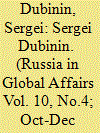

|
|
|
|
|
| Publication |
2012.
|
| Summary/Abstract |
The declaration of colossal losses on the subprime mortgage markets by the French bank BNP Paribas in August 2007 and the bankruptcy of the U.S. bank Lehman Brothers in September 2008 were the universally recognized omens of the looming global financial crisis. Five years have passed since then. The world is different. The economic life is now harsher, harder and sometimes beyond rational control on the basis of customary solutions that have taken decades to devise. Russia is no exception. Its economic problems are getting worse and very far from being resolved. But it is already clear at this point that we shall have to tackle them in close cooperation with partners and with due regard for global development trends.
|
|
|
|
|
|
|
|
|
|
|
|
|
|
|
|
| 16 |
ID:
118603


|
|
|
|
|
| Publication |
2012.
|
| Summary/Abstract |
As major pillars of collective identity, conventional conceptions of the past play an important role in modern political communities. Public history - distinguished from professional history as official interpretations of past events addressed to a broad public - is a central element of symbolic politics, which is targeted at building collective solidarity and forming an idea of 'We' in society. This aspect of symbolic politics is relevant for constructing all kinds of group identities, but it is particularly crucial in nation-building. Therefore it is not accidental that modern historiography is largely centered on writing histories of nation-states.
|
|
|
|
|
|
|
|
|
|
|
|
|
|
|
|
|
|
|
|
|